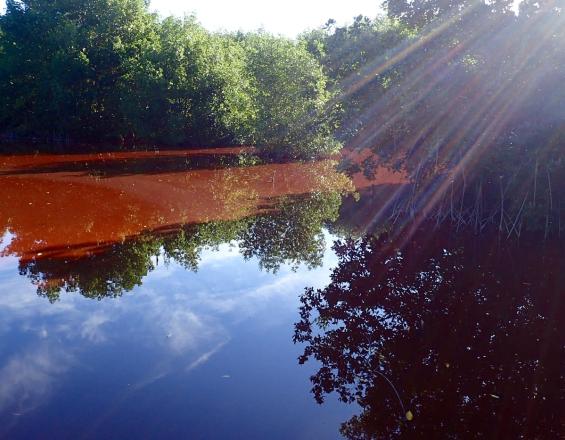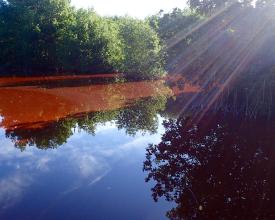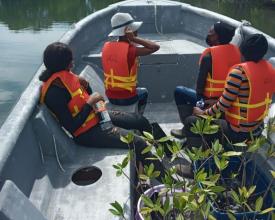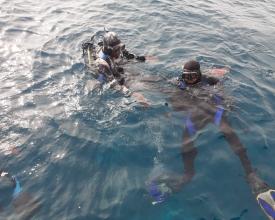
The development of a resilient sustainable finance plan for the Caribbean Coastal Area Management Foundation (C-CAM) to support the implementation of management actions in the Portland Bight Protected Area (PBPA), Jamaica

The Caribbean Coastal Area Management Foundation (C-CAM) manages the globally important Portland Bight Protected Area (PBPA) home to threatened and endemic species including crocodiles, the Jamaican Iguana, and three fish sanctuaries. Government subventions, fundraising, and eco-tourism declined due to COVID-19. Funds were sought to maintain core staff salaries; support patrolling and monitoring; provide training and supplies to protect staff from COVID-19; restart educational activities at our Portland Bight Discovery Centre and restore some revenue for C-CAM and the local communities. We started updating the strategic plan to ensure sustainability and adaptation and completed the organization's financial audit to ensure transparency. The impact of COVID19 also highlighted the need to focus on developing a robust financial sustainability programme to build the resiliency of our operations. Towards achieving this goal we updated C-CAM’s funding plan which will be the platform for the programme.
Context
Challenges addressed
As an environmental and development NGO C-CAM has been focused on the conservation of natural and heritage resources primarily with financial support from government subventions, as well as local and international donor funds. The impact of COVID19 resulted in the loss of some of these sources or an abrupt reduction in the amount over which C-CAM had no control and critically no resiliency funds or plan to utilize to put us on a path forward.
Location
Process
Summary of the process
Data collection and developing the plan are important tools in moving toward the achievement of a resilient financial sustainability programme. It is critical to understand what was done previously and by properly analyzing the gaps or shortcomings or what was done well it reduced the possibility of repeating the same mistakes and would lead to developing a plan that would serve the organization and move it in a more positive direction.
Building Blocks
Data gathering
The consultant conducted a desk survey which included reviewing the existing C-CAM funding plan prepared in 2015 looking at the gaps, especially in light of the impacts of COVID-19; looking at similar organizations to see what mechanisms they have in place; focusing on the practicality of the implementation actions suggested in the plan to determine if the goals were achievable or realistic and what would be needed to make them more so as well as if the actions would achieve those goals. The consultant also had to look at what had changed since 2015 and consider what prevented the implementation of the plan at a more practical level
Enabling factors
The consultant needed to have access to the 2015 plan. The consultant needed to be able to freely have discussions with team members regarding their knowledge of the plan and their feedback as to why the plan worked or did not work. Team members needed to be accessible as well as willing and able to freely provide the information needed by the consultant.
Lesson learned
An inception session with the team would have been helpful in ensuring all players understood what was being requested and how we would all benefit from the exchanges with the consultant. It would also have given the consultant a global view of where the organization was.
It would have also been useful to do anonymous surveys with team members to get their feedback on what is in the plan or what should be in the updated plan which would have allowed for more frank and open input
Financial sustainability development
The consultant utilized the data gathered to update the 2015 plan as part of the building block for C-CAM’s financial sustainability resilience programme. This included updating the existing plan with recommendations focused on gaps in the plan as well as feedback from team members and others. The new COVID19 impact also factored into the plan and a focus on building resiliency to that and potential future shocks. The development of the plan was participatory to ensure that team members who would be implementing understood their roles and had input in determining what those roles would entail. The plan was developed to be user-friendly, practical, realistic, and achievable.
Enabling factors
Team members - at least the board and staff have to be willing and able to participate in the process.
Enough time and funds need to be allocated for the participatory update of the plan.
Lesson learned
Financial sustainability development is a long-term process and sufficient funds and time need to be allocated to do that properly to include robust discussions with team members and others who are relevant to the process to allow them to participate in a meaningful way. This would ensure that the plan is utilized by the team since they would have the opportunity to participate more fully in the development and hopefully get buy-in to the plan. This would also have highlighted C-CAM’s commitment to participatory planning.
Training team members on how to implement the plan would also have assisted with the earlier utilization of the plan.
Working closely with all team members in the development of the plan would allow for clear roles to be assigned to them in the implementation of the plan.
The Executive Director had discussions with the consultant regarding the steps in the development of the plan and how the plan can be utilized which assisted with a more global outlook on the role of management in the financial resilience programme.
Impacts
The Conservation Officers were able to maintain up to 394 marine patrols during the period which resulted in fewer cases of poaching in the fish sanctuaries. The team supported the National Environment and Planning Agency (NEPA) in conducting crocodile surveys in several locations throughout Portland Bight which sought to determine habitat loss, numbers of crocodiles, and the public awareness information that will need to be developed based on the results or the need to amend laws to protect crocodiles more. The team was able to conduct the rescue and relocation of 10 crocodiles. In one case the team was not able to get to the site in a timely manner and the crocodile was killed, we infer the 10 rescued crocodiles could have had a similar fate.
Working with a consultant to discuss the need for sustainable financing allowed for thinking of the process of how to improve the management of the operations of the organization and build a resilient sustainable base starting with the updating of the funding plan. The updated funding plan supported the ability of C-CAM to apply for funds to train team members in the use of the plan and to get wider input and buy-in. The plan is also going to be used to approach corporate donors to contribute to C-CAM’s work even while we continue to apply to local and international donors.
Beneficiaries
Staff had salaries covered and received equipment. Government agencies supported crocodile surveys and rescues and were able to meet their mandate to provide information and collaborate. Staff participated in the updating of the funding plan.


